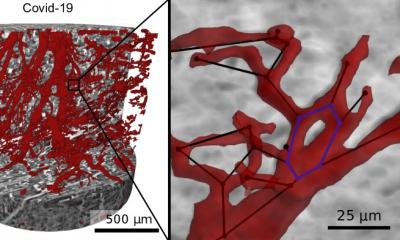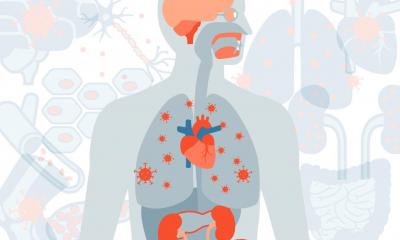
Image source: Scientific Animations, Inc.
News • High-risk group
Covid-19 doubles death rate in acute heart failure patients
Patients with acute heart failure nearly double their risk of dying if they get Covid-19, according to new research. The small, single centre study highlights the need for patients with heart failure to take extra precautions to avoid catching Covid-19.
The research was published in ESC Heart Failure, a journal of the European Society of Cardiology (ESC).
“Our results support prioritising heart failure patients for Covid-19 vaccination once it is available,” said study lead investigator Dr. Amardeep Dastidar, a consultant interventional cardiologist at North Bristol NHS Trust and Bristol Heart Institute, UK. “In the meantime, heart failure patients of all ages should be considered a high-risk group and be advised to maintain social distance and wear a face mask to prevent infection.”
Heart failure refers to progressive weakening of the heart’s pump function with symptoms of breathlessness, ankle swelling and fatigue. Sudden and severe worsening of symptoms is called acute heart failure – this is a medical emergency and requires admission to hospital for intravenous medication and intensive monitoring.
This study examined referral rates for acute heart failure during the pandemic and 30-day mortality. The analysis included 283 patients with acute heart failure admitted to the cardiology department of North Bristol NHS Trust. Two-thirds of the patients had chronic heart failure and presented with an acute deterioration. The date of the first UK coronavirus death, 2 March 2020, was the cut-off to define two groups: before-Covid (7 January to 2 March; eight weeks) and after-Covid (3 March to 27 April; eight weeks; i.e. during the pandemic).
Recommended article

Article • Public health
The fight against COVID-19 in the United Kingdom
The sunny Sunday of March 22, 2020, may well go down as a watershed date in the context of Coronavirus in the UK. A couple of days earlier, UK schools had closed en masse – open only thereafter for children of key workers – and the British government had advised that pubs, bars, cinemas, gyms and restaurants should close and people should adhere more rigorously to social distancing.
There was a substantial, but statistically non-significant, drop in admissions for acute heart failure during the pandemic. A total of 164 patients were admitted in the eight weeks before-Covid compared to 119 patients after-Covid – a 27% reduction (p=0.06). “This finding may reflect public concerns about social distancing at the start of the national lockdown, delayed reporting of symptoms, and anxiety regarding hospital attendance,” said Dr. Dastidar. “In support of these explanations, our data demonstrate an increase in referrals during the later weeks of lockdown in line with UK media reports encouraging patients to seek medical attention if needed.”
Our region had very low rates of Covid infection during the study and yet a connection with higher mortality was still apparent
Amardeep Dastidar
The 30-day mortality rate of patients with acute heart failure nearly doubled during the pandemic. Some 11% of patients in the before-Covid group died within 30 days compared to 21% of the after-Covid group – a relative risk of 1.9 (95% confidence interval 1.09–3.3).
The researchers examined what factors may have been responsible for the higher death rate during the pandemic. Older age and admission during the pandemic were linked with death after adjusting for other factors that could influence the relationship, with hazard ratios of 1.04 and 2.1, respectively. When patients with a positive Covid test were removed from the analysis, there was no difference in mortality between the before- and after-Covid groups – indicating that patients with both acute heart failure and Covid-19 had a poorer prognosis. “This may suggest a direct interaction or susceptibility to worse outcomes for acute heart failure patients with superimposed Covid infection,” said Dr. Dastidar. “It is noteworthy that our region had very low rates of Covid infection during the study and yet a connection with higher mortality was still apparent.”
Dr. Dastidar pointed out that routine testing for Covid-19 infection was not in place at the time of the study. He said: “It would be informative to review more recent admissions when Covid testing was more widely implemented to further support our findings. As this was a single centre study, it would be valuable to confirm the findings in a countrywide analysis. Additionally, we are keen to review longer term data to look for patterns of prognosis at later stages in this patient population.”
Source: European Society of Cardiology (ESC)
07.01.2021











